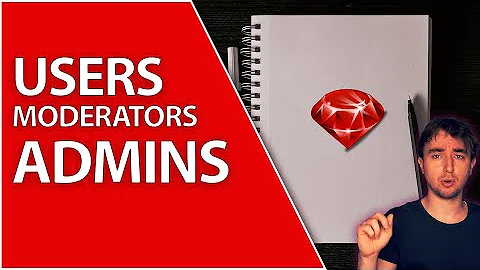How to log user_name in Rails?
Solution 1
I found this little tricky but working solution.
Warden stores user information in session, but req.session is not available for logging.
So you must add this to config/application.rb
config.middleware.delete(ActionDispatch::Cookies)
config.middleware.delete(ActionDispatch::Session::CookieStore)
config.middleware.insert_before(Rails::Rack::Logger, ActionDispatch::Session::CookieStore)
config.middleware.insert_before(ActionDispatch::Session::CookieStore, ActionDispatch::Cookies)
Then create file config/initializers/logging.rb
Rails.configuration.log_tags = [
proc do |req|
if req.session["warden.user.user.key"].nil?
"Anonym"
else
"user_id:#{req.session["warden.user.user.key"][0][0]}"
end
end
]
Now I see this for Anonymous:
[Anonym] Served asset ...
and this for user:
[user_id:1] Served asset ...
Solution 2
I used this solution from Wojtek Kruszewski: https://gist.github.com/WojtekKruszewski
I tweaked a little bit for my project to only include id, but basically the same.
# config/application.rb
config.log_tags = [
->(req){
if user_id = WardenTaggedLogger.extract_user_id_from_request(req)
user_id.to_s
else
"?"
end
}
]
And create this initializer
# initializers/warden_tagged_logger.rb
module WardenTaggedLogger
def self.extract_user_id_from_request(req)
session_key = Rails.application.config.session_options[:key]
session_data = req.cookie_jar.encrypted[session_key]
warden_data = session_data["warden.user.user.key"]
warden_data[0][0]
rescue
nil
end
end
Solution 3
Added 2013-03-07:
In Rails 4 encrypted_cookie_store is the default session store. This is how you can access session data:
session_data = req.cookie_jar.signed[ "_qnaire_session" ]
And it looks like warden_data looks differently in my new app, e.g.: [[542], "$2a$10$e5aYxr/PIp6OOj8jzE7mke"], where first item is user id.
Here's my current snippet: https://gist.github.com/wojt-eu/5109643
Previous version:
This is what I came up with:
config.log_tags = [
:remote_ip,
->(req){
session_data = req.cookie_jar.signed[ "_qnaire_session" ]
warden_data = session_data["warden.user.provider_user.key"]
if warden_data
'#' + warden_data[1][0].to_s
else
"guest"
end
}
]
_qnaire_session can be replaced with instance.config.session_options[:key] or via singleton: Rails.application.config.session_options[:key]
I have ProviderUser model, hence warden.user.provider_user.key. I suppose with User model this would be warden.user.user.key.
It's messy, but it does not affect normal authentication process, middleware stack order etc. If it breaks during some update only tagging logs will be affected, which I should quickly notice while looking at development logs.
Solution 4
Here is the cookie decrypter I use in Rails 5.1 to tag the logs with the user_id, which is stored in the cookie. It basically lets me access the controller equivalent of session[:user_id] from a raw cookie
environments/production.rb:
config.log_tags = [
:request_id,
:remote_ip,
lambda do |req|
session_data = CookieDecrypter.new(req).session_data
"user_id:#{session_data['user_id']}"
end
]
app/models/cookie_decrypter.rb:
class CookieDecrypter
attr_reader :request
def initialize(request)
@request = request
end
def session_data
cookie = request.cookies[session_key]
return {} unless cookie.present?
cookie = CGI::unescape(cookie)
key_generator = ActiveSupport::KeyGenerator.new(secret_key_base, iterations: 1000)
secret = key_generator.generate_key(salt)[0, ActiveSupport::MessageEncryptor.key_len]
sign_secret = key_generator.generate_key(signed_salt)
encryptor = ActiveSupport::MessageEncryptor.new(secret, sign_secret, serializer: JSON)
encryptor.decrypt_and_verify(cookie) || {}
end
private
def session_key
Rails.application.config.session_options[:key]
end
def secret_key_base
Rails.application.secrets[:secret_key_base]
end
def salt
Rails.application.config.action_dispatch.encrypted_cookie_salt
end
def signed_salt
Rails.application.config.action_dispatch.encrypted_signed_cookie_salt
end
end
Solution 5
What almost worked for me (Rails 3.2.22.2) is the answer from here: http://benjit.com/rails/logger/2016/02/26/getting-admin-user-into-rails-logfile/
This assumes that the cookie_jar object responds to encrypted. However it wasn't the case for me. What ultimately worked for me is as follows:
config/initializers/logging.rb:
Rails.configuration.log_tags = [
lambda { |req|
session_key = Rails.application.config.session_options[:key]
session_data = req.cookie_jar.signed[Rails.application.config.session_options[:key] ]
warden_data = ( session_data["warden.user.user.key"]|| [[]])
admin_user = warden_data[0][0]
"u: #{admin_user || 0}"
}
]
Related videos on Youtube
boblin
Updated on September 14, 2022Comments
-
boblin almost 2 years
I use Devise in Rails 3. I want to see name of current_user in production.log.
I would like to configure rails like this:
config.log_tags = [:user_name]-
 aceofspadesI'm using github.com/roidrage/lograge for this
aceofspadesI'm using github.com/roidrage/lograge for this
-
-
boblin about 12 yearsThank's for reply. I tried your first example but it does not work for me. I get "Internal Server Error".
-
 Viktor Trón about 12 yearshow about now? channge to req.env
Viktor Trón about 12 yearshow about now? channge to req.env -
boblin about 12 yearsThere is also missing final ']', but I still get "Internal Server Error".
-
rit about 10 years@CharlesBergeron Did you figure out if this approach is ok or not?
-
 Chuck Bergeron about 10 years@rit Yep, went with inserting our own custom logging Middleware like this:
Chuck Bergeron about 10 years@rit Yep, went with inserting our own custom logging Middleware like this:require_relative '../lib/my_app/log_user_id'config.middleware.insert_after(ActiveRecord::SessionStore, MyApp::LogUserId) -
rit almost 10 years@CharlesBergeron Thanks!
-
 Rafael Oliveira over 9 yearsBest way to go. Thanks
Rafael Oliveira over 9 yearsBest way to go. Thanks -
Fabio about 9 yearsThis is the cleanest approach.
-
oligan almost 8 yearsIs "qnaire" short for "questionnaire"?
-
Ali Guliyev almost 8 years@AndrewGrimm yes (-:
-
mrstif about 7 yearsBe mindful that this approach does not work properly when trying to change your cookie store options. your options will basically be discarded









